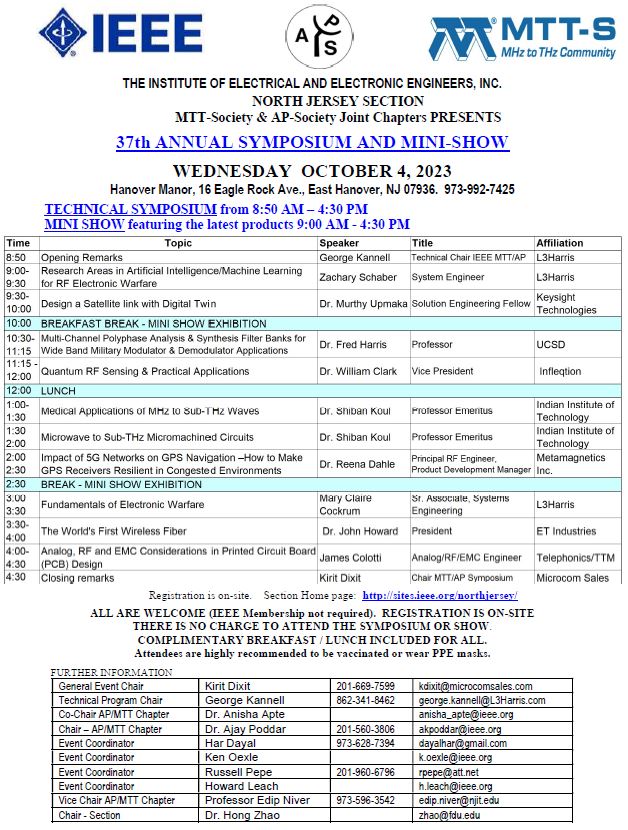Multi-Channel Polyphase Analysis & Synthesis Filter Banks for Wide Band Military Modulator & Demodulator Applications

All multichannel receivers and transmitters are implemented by polyphase analysis and synthesis filter banks, which perform a remarkable list of desirable performance and implementation options; implementation efficiency is a prime attraction. We emphasize using polyphase channelizers for military applications, including Communications, Surveillance, Satellite, Radar, and Sonar Systems. For example, a data collection platform pulling signals off a satellite containing 100’s arbitrary bandwidth, arbitrarily spaced signals used separate receivers for each signal. We replaced the multiple receivers with single multiple-band polyphase filter bank-based receivers. This proved to be an embarrassment of riches, the system did not have sufficient resources to monitor the increased number of collected signals. Another example is using polyphase channelizer-based receivers to identify and classify radar interrogations in a radar system. We will demonstrate examples in which the polyphase filter bank replaced traditional receiver architectures with an order-of-magnitude reduction in DSP workload. The remarkable efficiency of modern channelizers is the reason they are embedded in LEO and Geo satellites. We will develop and illustrate MATLAB simulations of a number of polyphase channelizers.
Over the last decade new channelizers have been developed with new capabilities. This tutorial will review the early implementation options and show interesting and desirable new capabilities. Much of the early activity is well documented in the first edition of the Harris text “Multirate Signal Processing for Communication Systems. More recent work is to be found in the recently released second edition of the same book.
The tutorial aims to introduce and familiarize the DSP radio designer with this rich multichannel filter bank system's new, interesting, and useful capabilities. The motivation to share this work with practitioners is to help them improve performance, reduce costs, and raise designer satisfaction.
Date and Time
Location
Hosts
Registration
-
 Add Event to Calendar
Add Event to Calendar
Speakers
Prof. Dr. Fred Harris of UCSD
Multi-Channel Polyphase Analysis & Synthesis Filter Banks for Wide Band Military
Biography:
Professor Fred Harris is at the University of California San Diego, where he teaches and conducts research on Digital Signal Processing and Communication Systems. He holds 40 patents on digital receivers and DSP technology and lectures throughout the world on DSP applications. He consults for organizations requiring high-performance, cost-effective DSP solutions. He has written 280 journal and conference papers, the most well-known being his 1978 paper “On the use of Windows for Harmonic Analysis with the Discrete Fourier Transform” (9400 citations). He is the author of the book Multirate Signal Processing for Communication Systems. He is co-authored with Bernard Sklar of 3rd edition Digital Communications and has contributed to several other DSP books. His special areas include polyphase filter banks, physical layer modem design, synchronizing digital modes, and spectrum estimation. He was the Technical and General Chair, respectively, of the 1990 and 1991 Asilomar Conferences on Signals, Systems, and Computers. He was the Technical Chair of the 2003 Software Defined Radio Conference, the 2006 Wireless Personal Multimedia Conference, the DSP-2009 and DSP-2013 Conferences, and the SDR-WinnComm 2015 Conference. He was Editor in Chief of Elsevier’s DSP Journal. Became a Fellow of the IEEE in 2003, cited for contributions of DSP to communications systems. 2006, he received the Software Defined Radio Forum’s “Industry Achievement Award.”
and received the DSP-2018 conference’s commemorative plaque with the citation: We wish to recognize and pay tribute to Fred Harris for his pioneering contributions to digital signal processing algorithmic design and implementation and his visionary and distinguished service to the Signal Processing Community.
Email:
Address:New Jersey, United States
